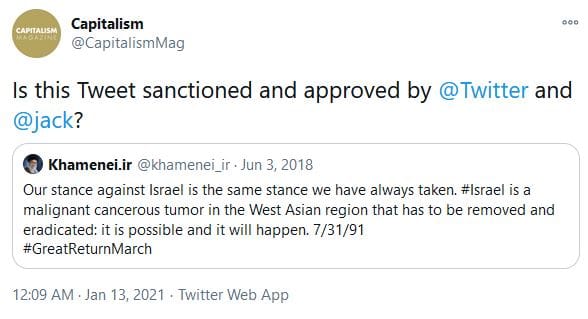Twitter removing Tweets at its fancy is
not censorship if Twitter is doing so of its own free-will.No one has the
right to Tweet, it is a
privilege. The
right to determine what goes on the Twitter website belongs to the owners of Twitter. If someone (like a government bureaucrat) is forcing Twitter to remove certain Tweets, or forcing them to display certain Tweets, then they are censoring Twitter.If Twitter bans a user from "speaking" on their platform they are free to speak elsewhere or create their own platform. Their right to freedom of speech remains unabridged.How is this possible? It is because individual rights form a
unity. There is only one right - the right to life - which is the freedom to take those actions necessary to preserve one's life and pursue one's happiness so long as one does not violate the rights of others.All other rights (right to property, right to freedom of speech, etc.) are
derivatives of the fundamental right to life and when properly defined
do not contradict each other. Thus Twitter's
right to use and dispose of its property does not contradict one's right to speak freely free from the initiation of physical force (such as threats of imprisonment or threats of physical violence).Not so with the collectivist notion of "rights" which holds that a property owner does not have an inalienable
right to their property, but may only use their property by
permission of the collective, the "people", the state. Ayn Rand brilliantly demonstrates the contradictions inherent in the collectivist notion of "censorship" when she notes:
"For years, the collectivists have been propagating the notion that a private individual’s refusal to finance an opponent is a violation of the opponent’s right of free speech and an act of “censorship.”"It is “censorship,” they claim, if a newspaper refuses to employ or publish writers whose ideas are diametrically opposed to its policy."It is “censorship,” they claim, if businessmen refuse to advertise in a magazine that denounces, insults and smears them . . . . [“Man’s Rights” The Virtue of Selfishness, 98]
Or: It is censorship if Twitter refuses to display a Tweet on its website that it disagrees with.Such a confused notion of censorship turns the meaning of censorship on its head:
"[This collectivist notion] means that the ability to provide the material tools for the expression of ideas deprives a man of the right to hold any ideas. It means that a publisher has to publish books he considers worthless, false or evil — that a TV sponsor has to finance commentators who choose to affront his convictions — that the owner of a newspaper must turn his editorial pages over to any young hooligan who clamors for the enslavement of the press. It means that one group of men acquires the “right” to unlimited license — while another group is reduced to helpless irresponsibility." [“Man’s Rights” The Virtue of Selfishness, 98]

